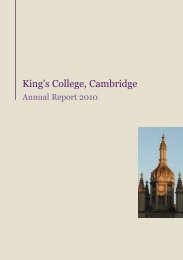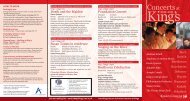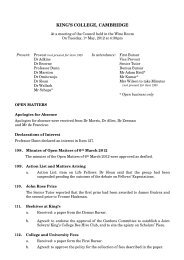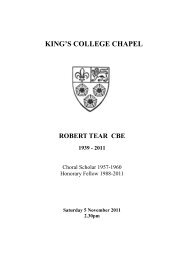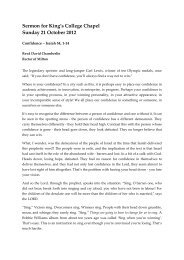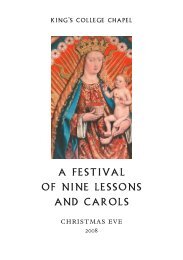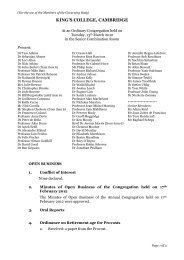Part 2 (Obituaries) - King's College - University of Cambridge
Part 2 (Obituaries) - King's College - University of Cambridge
Part 2 (Obituaries) - King's College - University of Cambridge
Create successful ePaper yourself
Turn your PDF publications into a flip-book with our unique Google optimized e-Paper software.
WOLFE MAYS (1940) was an eminent philosopher with a long and<br />
distinguished career spanning almost six decades. By the end <strong>of</strong> his life, he<br />
was probably the last philosopher alive to have known both Collingwood and<br />
Wittgenstein. His younger colleagues found him to be an apparently<br />
inexhaustible source <strong>of</strong> philosophical lore; there seemed to be no one <strong>of</strong> note<br />
that Wolfe had not known, taught or been taught by, or disagreed with.<br />
Wolfe came to King’s as a graduate student, where he wrote his PhD thesis on<br />
the philosophy <strong>of</strong> A N Whitehead. Once this was completed in 1944, he<br />
moved for a year to the <strong>University</strong> <strong>of</strong> Edinburgh where he was Assistant<br />
Lecturer in Logic and Metaphysics, and then moved to take up a post in the<br />
Philosophy Department at the <strong>University</strong> <strong>of</strong> Manchester, where he was to<br />
remain until his retirement in 1979.<br />
Wolfe despised Oxford-style analytical philosophy, being more <strong>of</strong> a<br />
Continentalist and a historian <strong>of</strong> science. He was particularly fascinated with<br />
the whole question <strong>of</strong> thinking and learning, exploring how we move from a<br />
state <strong>of</strong> not knowing to a state <strong>of</strong> understanding. His contact with Alan Turing<br />
helped to develop his interest in models <strong>of</strong> human mental functions, and this<br />
led him to work with the team Jean Piaget had established in Geneva studying<br />
the acquisition <strong>of</strong> logical and mathematical concepts by young children; many<br />
important publications came out <strong>of</strong> this fruitful partnership.<br />
Perhaps because <strong>of</strong> his repeated visits to the Continent to work with Piaget,<br />
Wolfe became interested in phenomenology and existentialism, an interest<br />
that influenced his lecturing. In 1970, he founded the British Society for<br />
Phenomenology, and was a very active editor <strong>of</strong> its journal until the time <strong>of</strong><br />
his death on 21 January 2005.<br />
Wolfe loved university life and took part in all aspects <strong>of</strong> it with great energy.<br />
He was an active member <strong>of</strong> the AUT and served on the National Executive<br />
and as President <strong>of</strong> the Manchester <strong>University</strong> branch. He unfailingly attended<br />
departmental research seminars and could always find something to say after<br />
the delivery <strong>of</strong> a paper, saving his colleagues sometimes from potentially<br />
embarrassing silences. He liked teaching and was skilful at adapting his style<br />
163<br />
OBITUARIES



